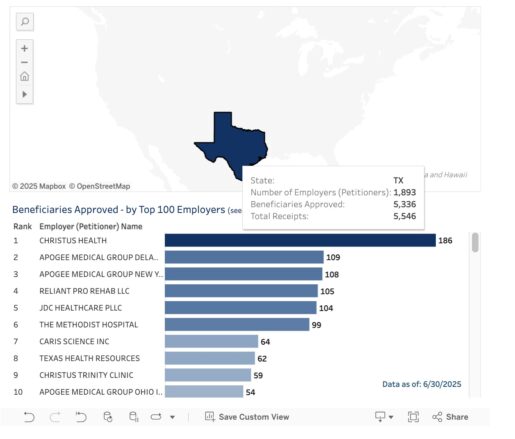Employers of doctors could be spared from paying President Donald Trump’s new $100,000 H-1B visa fee, easing concerns among hospitals and medical groups about shortages in underserved areas.
The proclamation, issued September 19, ordered that all new H-1B petitions include the six-figure payment. While Commerce Secretary Howard Lutnick initially described the charge as annual, the administration later clarified it would be a one-time fee, The Dallas Express reported.
To be clear:
1.) This is NOT an annual fee. It’s a one-time fee that applies only to the petition.
2.) Those who already hold H-1B visas and are currently outside of the country right now will NOT be charged $100,000 to re-enter.
H-1B visa holders can leave and re-enter the…
— Karoline Leavitt (@PressSec) September 20, 2025
White House spokesperson Taylor Rogers told Bloomberg News that “the Proclamation allows for potential exemptions, which can include physicians and medical residents,” adding that the administration “defers to the language in the proclamation.”
The order says the Secretary of Homeland Security may waive the charge when hiring is deemed “in the national interest.” The Department of Homeland Security has reportedly not responded to questions about how those determinations will be made.
Trump officials said the measure was intended to curb abuse in the program.
Lutnick called H-1B “the most abused visa” and said the fee would discourage companies from “spamming the system” with speculative applications, according to a White Coat Investor post by Dr. Jim Dahle.
Healthcare organizations have warned that the policy could strain rural hospitals. “We will also work with the Administration to stress the importance of including health care personnel in potential exemptions to these changes,” an American Hospital Association spokesperson said, per Bloomberg.
Texas’s healthcare institutions widely use H-1B visas.
Just in the Lone Star State, USCIS’s H-1B Data Hub shows 5,336 beneficiaries have been approved since 2019, with Christus Health, Apogee Medical Group, and Reliant Pro Rehab ranking among the top employers. It is not immediately clear how many of those positions were for doctors as opposed to other healthcare personnel.
Hospital industry stocks rose on the possibility of a waiver. HCA Healthcare shares gained as much as 1.4 percent, and Tenet Healthcare rose 3.1 percent after reports of potential exemptions, Bloomberg reported.
For doctors, the uncertainty has added a layer of complexity to career planning. Dahle noted that while many foreign residents train in the U.S. on J-1 visas—which are not affected—others depend on H-1B visas. “The main effect here is that the pendulum between H-1B and J-1 will swing even further toward the J-1 side,” Dahle wrote, predicting fewer foreign doctors will remain in the U.S. after training.
The White House has said the policy will take effect with the next H-1B lottery cycle. It remains unclear whether doctors will receive industry-wide exemptions or need to apply on a case-by-case basis.



